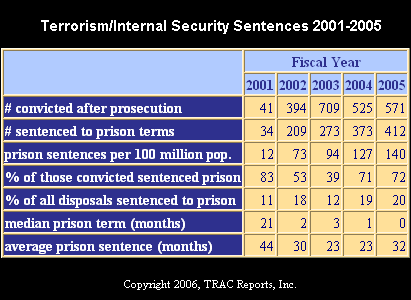How We're Winning the War on Terror (on Paper)
A recent Knight-Ridder report on the "increase" in terrorism attacks suggests that the scary numbers (over 10,000 in 2005) are partly due to changes in the way terrorist attacks are counted. This is consistent with the way the numbers have been inflated to make domestic prosecution of the war on terror look better. Consider this table, which I generated from TRAC data based on what the US Department of Justice refers to as Internal Security/Terrorism cases:

The first line looks great... terrorism convictions are up over 1300% since 2001! (Note: these data are for fiscal years, which end in September of each year, so fiscal year 2001 ended 9/31/2001, which makes the years 2002-2005 a good way to gauge the post-9/11 response.) But the closer you look, the less attractive these numbers appear.
Even though we've had a lot more terrorism-related convictions since 9/11, the percentage of those convicted who get jail time has gone down, from 83 percent in 2001 to 72 percent in 2005. There was a steep decline in the first years after 9/11, and the conviction rate has increased since then but still not to the level it was in 2001.
But I think the really telling numbers are found in the sentences. The average sentence in 2005 was 32 months, over 25% shorter than it was in 2001. Moreover, the median sentence has dropped from 21 months to essentially zero! A median means half got more, half got less... so over half the terrorism convictions after 9/11 resulted in basically no prison time.
This offers more evidence that the offenses for which convictions were attained since 9/11 are actually far more minor than what been considered terrorism pre-9/11.

The first line looks great... terrorism convictions are up over 1300% since 2001! (Note: these data are for fiscal years, which end in September of each year, so fiscal year 2001 ended 9/31/2001, which makes the years 2002-2005 a good way to gauge the post-9/11 response.) But the closer you look, the less attractive these numbers appear.
Even though we've had a lot more terrorism-related convictions since 9/11, the percentage of those convicted who get jail time has gone down, from 83 percent in 2001 to 72 percent in 2005. There was a steep decline in the first years after 9/11, and the conviction rate has increased since then but still not to the level it was in 2001.
But I think the really telling numbers are found in the sentences. The average sentence in 2005 was 32 months, over 25% shorter than it was in 2001. Moreover, the median sentence has dropped from 21 months to essentially zero! A median means half got more, half got less... so over half the terrorism convictions after 9/11 resulted in basically no prison time.
This offers more evidence that the offenses for which convictions were attained since 9/11 are actually far more minor than what been considered terrorism pre-9/11.
A less-recent but more complete and still-relevant analysis of post-9/11 terrorism enforcement can be found in this TRAC Terrorism Report.


0 Comments:
Post a Comment
<< Home